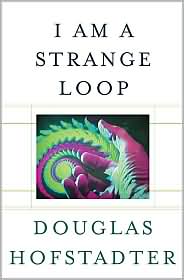Ye Olde Natural Philosophy Discussion Group
Reviews and comments on
Douglas Hofstadter:
I Am a Strange Loop [2007]

This is one of those books where our group stongly split on our individual evaluations. Three people gave it the very high rating of 8 (on a scale of 0 to 10), while two gave it 0 and one person gave it only a 3. Just one person (Rich) gave it a middle-ground rating of 5. Our group average is 4.6 (which might change slightly when another couple ratings come in).
Scott suggested the book so he went first in his comments on it. (We’ll reluctantly allow him to go on at some length!):
I didn’t much care for the first chapter, and thought the stuff promoting vegetarianism, for example, was off topic. But chapters 2 through 7 were first rate! I was especially impressed by the theme of the 3rd chapter, “The Causal Potency of Patterns”. I think anyone who really grasps that point has got down the essential difference between mind and brain. Mental categories such as “ideas”, “thoughts”, “desires”, or “memories” are abstract patterns (or “symbols” as Hofstadter puts it) whose physical foundations are the various neuronal structures and connections of the brain.
So at page 100, after reading those first 7 chapters, I thought to myself “This book is really excellent; I’m going to have to give it the highest rating, a 10!” But then came the next several chapters on strange loops and Gödel’s proof! And that caused me to lower my appraisal of the book by a couple notches.
I understand why Hofstadter put those chapters in and gave so much emphasis to Gödel. Basically he thinks that the main and best way to explain something is to give a good analogy for it (a point which I agree with). Moreover, it is sometimes the case that there is really only one good analogy available to explain something, or at least only one particularly good analogy. I would even go along with that point. When it comes to explaining the relationship of mind to brain I think that the “best available analogy” is the relationship of software to hardware in computers, as I talk about at length in my essay on that topic. But Hofstadter thinks that by far the best way to explain consciousness, or the self, or what this curious thing “I” refers to, is “a strange loop”. And “strange loops” he seems to think, can only be explained, or at least can best be explained, by explicating the nature of Gödel’s proof about the imcompleteness of any formal logical system of the sort of Whitehead and Russell’s Principia Mathematica.
As it happens, I might be fairly well equipped to almost grasp what Hofstadter is talking about there. I read with enjoyment (most of the time!) his earlier opus, Gödel, Escher and Bach (1979), and in high school I even read the same book by Nagel and Newman on Gödel’s proof that Hofstadter himself did, the one which led to his fixation on the topic. Moreover, I took several courses on symbolic and philosophical logic in college. I even read portions of Principia Mathematica (to section *56)! So I would guess that I am much better prepared to understand and appreciate his elaborate analogy between the “strange loops” of consciousness and Gödel’s strange loops in mathematical logic than most of his readers will likely be. But despite this, I am not impressed by that analogy.
For an analogy of A to B to explicate B, one must first really understand A. If A is just too difficult for most people to truly and clearly understand, then it is not going to be of any value to them in coming to understand B. Is Hofstadter, as almost seems to be the case, really saying that someone must understand the essential aspects of Gödel’s proof before they can really understand consciousness? Personally, I just don’t believe that at all. In fact, except possibly when talking to logicians or mathematicians, I don’t think it is even appropriate to mention Gödel when trying to explicate consciousness!
Most of the last couple hundred pages of the book are once again quite good. I thought Hofstadter hugely overstated the extent to which we human beings have an “existence” in the brains of other people (chapter 17). But most of the other points about consciousness being simply the same thing as “thinking” or “symbol manipulation”, or about the absurdity of the inverted color spectrum or “zombies”, was very much on the mark. I just hope that not too many people got so turned off by Gödel and talk about “strange loops” that they never got that far in the book!
Finally, I really have to strongly complain about his identification of consciousness, the self, or the “I”, with the “soul”. It might even be that in some future, more rational and more materialist (in the philosophical sense) world, people might appropiate the word ‘soul’ in this way. But it is really wrong to try to do so when the vast majority of people think of the soul as an immaterial, religious entity. They won’t understand what you’re talking about! Hofstadter should take a step out of academia once in a while and see what sort of irrational and nonsensical thinking we have to deal with daily out here in the real world!
OK, OK, that’s enough, that’s it for you, Scott! What did other people have to say about the book?
Kevin thought that the book was unreadable, and gave it a zero! Thomas didn’t read the book yet, but might, based on our group discussion.
Kirby liked the book a lot, though he hasn’t quite finished it yet. Contrary to what Scott said, Kirby liked the discussion of Gödel’s proof, and found it quite helpful. He was also quite touched by the emails in which Hofstadter talked about his dead wife, and on how he felt she still lived on within him in a way (because over the years he had learned so many things about what she liked, how she thought, and so forth). Kirby felt this showed that a scientific understanding of the mind and of people in general does not have to be cold and unemotional.
Kirby did allow that the book is somewhat hard to understand in places, and that it is slow going to read a book like this. At times he felt as if Hofstadter was beating a dead horse. But overall he thinks this is a really good book.
Barbara didn’t care for the book and thought that it really rambled a lot. She thought that what the book said about the soul and consciousness was fine, but that much of the book didn’t really make any sense to her. She viewed the book as having little actual science in it, and as being basically philosophy not science. She summed up her negative view of the book in a delightful comment: “I found this book really easy to put down!”
Rosie had a very positive attitude toward the book, and thought that the first part of it anyway was very well written. She liked the suggestive illustrations, and the comments on them that Hofstadter made, such as in discussing Escher’s drawing “Hands drawing hands” (two hands drawing each other). What if there were two hands erasing each other, Hofstadter asked! Rosie also like the discussion of Bach and music in general.

While Rosie thought that Hofstadter should have pared down the chapters on Gödel, she actually felt that “For the first time I’ve got an idea of what mathematicians do.” So this was sort of a side benefit for her from this extended analogy. Rosie said there were many good ideas through the book, such as the comment that while you “Can’t put an elephant in a matchbook, you can put their DNA in a matchbook.” This was helpful in coming to understand how something might be able to refer to itself without including its whole self in the actual reference. Rosie liked Hofstadter’s assertion that consciousness is actually an illusion, even if a “necessary one”! (Scott snorted about that, but we’ve heard enough from him!) Overall she really enjoyed the book.
Ron, on the other hand, was one of the “naysayers”! He agreed with Barbara’s comment that this was an “easy book to put down”, and gave it a zero. He noted that this was the first of our book club books that he has not finished. Ron agreed that Hofstadter had made some good points, but they were only like occasional specks in a great mass of material he wasn’t interested in. He felt that he just had to read too much to get to the good parts.
Rich was the only guy in the middle about this book. (He gave it a 5.) He thought there were lots of good stuff in it. But he said that while Rosie commented that the book really grabbed her, it really grabbed him too ... but by the throat! He added that “My head was spinning most of the time, mostly because of the way he wrote it.” Rich thought the book was tedious, and also felt that Hofstadter was often beating a horse to death. One example, he said, was the excessive material on video feedback loops. But Rich also agrees with Hofstadter’s general view about consciousness and the self.
John missed the meeting, and has yet to weigh in on the book, although he hinted in an email that his views are on the negative side.
Well there you have it folks! We hope our conflicted group attitudes help give you a good overall view of this book!